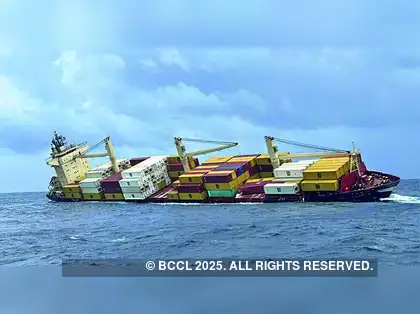
On May 24, MSC ELSA-3 was 38 nautical miles off the Kochi coast when it developed a list, or tilt to one side, prompting a distress call. Among the ship's 640 containers, 12 were loaded with calcium carbide, a hazardous chemical known for its violent reaction with water. It had 367.1 MT of low- sulphur fuel oil and 84.4 MT of diesel in its tanks. A day later, the ship capsized and sank in one of the biggest shipping disasters on the Indian coast.
India's limited capacity to mount a coordinated emergency response and the absence of tier-1 oil spill and salvage capacity in Indian ports such as Kochi, where the ship was headed, played on the minds of authorities. An oil/hazardous chemical spill would be disastrous for the environment and coastal communities, apart from the expensive clean-up. Even the state- owned Cochin Port Authority did not have ocean-going tugs or oil spill response units to assist the ship.
As authorities scrambled to get details of the ship for the next course of action, they encountered an opaque and under-regulated dimension of global maritime commerce: the fragmented ownership, registration, management and manning structures that define global shipping operations today.
Far from being an anomaly or an isolated incident, the ship's convoluted configuration is emblematic of a deliberate design prioritising legal insulation over accountability.
When the ship went down, it was flying Liberia's flag - a classic Flag of Convenience (FoC) choice known for minimal regulatory intervention. An FoC, or open registry, is a business practice whereby a shipowner registers a vessel in the ship register of a country other than their own. The FoC regime does not levy any tax on shipowners but charges an annual amount based on the ship's gross registered tonnage (GRT).
MSC ELSA-3 is owned by a German company, chartered on a slot-sharing basis by Mediterranean Shipping Company S.A., headquartered in Geneva, and managed operationally by a firm based in Cyprus. The ship classification responsibilities were assigned to the French classification society Bureau Veritas, while a multinational crew manned the ship.
When MSC ELSA-3 capsized and sank, it became impossible to pin down a single point of liability or even a coherent chain of operational command. Liberia declined to participate in the investigation. The classification society that had certified the ship as seaworthy was not accountable for oversight failures. The German shipowner has maintained a legal distance through limited liability constructs. The manager in Cyprus held operational control, but not ultimate legal liability. MSC, the container shipping behemoth, claimed only a commercial interest through the chartering of the ship.
The fragmented control structure obstructs clear liability and limits enforceability. The flag state's refusal to participate in the post-incident investigation exemplifies the dilution of responsibility that FoC registration permits.
This extreme fragmentation of responsibility is engineered. It allows shipowners and charterers to dilute exposure to environmental damage claims, labour violations, tax liabilities and safety lapses.
In the case of MSC ELSA-3, this is further evidenced by the vessel's documented history of frequent name changes and ship registry shifts. The ship had changed its identity at least 10 times in less than two decades - an opportunity to shed liability, evade scrutiny, or reposition under a more favourable regulatory regime.
Such practices, while not illegal, are at odds with the principles of transparency and responsibility embedded in the global maritime regulatory framework. The International Maritime Organization (IMO) has promoted uniform safety and environmental standards, but fragmented governance severely weakens enforcement.
When a ship like MSC ELSA-3 suffers a major casualty, coastal states like India are left to manage the colossal crisis, involving a clean-up costing hundreds of crores, with minimal cooperation.
The issue is compounded by the lack of mandatory public disclosure on beneficial ownership, the actual role of commercial operators in daily navigation decisions, and the operational influence of ship managers. Even in cases where insurers such as the protection and indemnity (P&I) clubs (third-party liability underwriters for ships) are involved, jurisdictional complications and multilayered contracting structures delay compensation, investigation and resolution.
If India is to protect its coast, trade routes and maritime environment, it must challenge this structural opacity. Ships calling at Indian ports must be subjected to stricter requirements on transparency in ownership, crew composition and management accountability. India must also push the IMO for reforms mandating full disclosure of beneficial ownership, enhanced flag state obligations, and clearer delineation of managerial versus operational control responsibilities.
If left unchecked, this model will continue to shift the consequences of maritime failures onto states and communities least equipped to bear them. It is time for coastal nations to reclaim regulatory authority over ships that enter their waters, regardless of the paper trail they carry.
India's limited capacity to mount a coordinated emergency response and the absence of tier-1 oil spill and salvage capacity in Indian ports such as Kochi, where the ship was headed, played on the minds of authorities. An oil/hazardous chemical spill would be disastrous for the environment and coastal communities, apart from the expensive clean-up. Even the state- owned Cochin Port Authority did not have ocean-going tugs or oil spill response units to assist the ship.
As authorities scrambled to get details of the ship for the next course of action, they encountered an opaque and under-regulated dimension of global maritime commerce: the fragmented ownership, registration, management and manning structures that define global shipping operations today.
Far from being an anomaly or an isolated incident, the ship's convoluted configuration is emblematic of a deliberate design prioritising legal insulation over accountability.
When the ship went down, it was flying Liberia's flag - a classic Flag of Convenience (FoC) choice known for minimal regulatory intervention. An FoC, or open registry, is a business practice whereby a shipowner registers a vessel in the ship register of a country other than their own. The FoC regime does not levy any tax on shipowners but charges an annual amount based on the ship's gross registered tonnage (GRT).
MSC ELSA-3 is owned by a German company, chartered on a slot-sharing basis by Mediterranean Shipping Company S.A., headquartered in Geneva, and managed operationally by a firm based in Cyprus. The ship classification responsibilities were assigned to the French classification society Bureau Veritas, while a multinational crew manned the ship.
When MSC ELSA-3 capsized and sank, it became impossible to pin down a single point of liability or even a coherent chain of operational command. Liberia declined to participate in the investigation. The classification society that had certified the ship as seaworthy was not accountable for oversight failures. The German shipowner has maintained a legal distance through limited liability constructs. The manager in Cyprus held operational control, but not ultimate legal liability. MSC, the container shipping behemoth, claimed only a commercial interest through the chartering of the ship.
The fragmented control structure obstructs clear liability and limits enforceability. The flag state's refusal to participate in the post-incident investigation exemplifies the dilution of responsibility that FoC registration permits.
This extreme fragmentation of responsibility is engineered. It allows shipowners and charterers to dilute exposure to environmental damage claims, labour violations, tax liabilities and safety lapses.
In the case of MSC ELSA-3, this is further evidenced by the vessel's documented history of frequent name changes and ship registry shifts. The ship had changed its identity at least 10 times in less than two decades - an opportunity to shed liability, evade scrutiny, or reposition under a more favourable regulatory regime.
Such practices, while not illegal, are at odds with the principles of transparency and responsibility embedded in the global maritime regulatory framework. The International Maritime Organization (IMO) has promoted uniform safety and environmental standards, but fragmented governance severely weakens enforcement.
When a ship like MSC ELSA-3 suffers a major casualty, coastal states like India are left to manage the colossal crisis, involving a clean-up costing hundreds of crores, with minimal cooperation.
The issue is compounded by the lack of mandatory public disclosure on beneficial ownership, the actual role of commercial operators in daily navigation decisions, and the operational influence of ship managers. Even in cases where insurers such as the protection and indemnity (P&I) clubs (third-party liability underwriters for ships) are involved, jurisdictional complications and multilayered contracting structures delay compensation, investigation and resolution.
If India is to protect its coast, trade routes and maritime environment, it must challenge this structural opacity. Ships calling at Indian ports must be subjected to stricter requirements on transparency in ownership, crew composition and management accountability. India must also push the IMO for reforms mandating full disclosure of beneficial ownership, enhanced flag state obligations, and clearer delineation of managerial versus operational control responsibilities.
If left unchecked, this model will continue to shift the consequences of maritime failures onto states and communities least equipped to bear them. It is time for coastal nations to reclaim regulatory authority over ships that enter their waters, regardless of the paper trail they carry.








